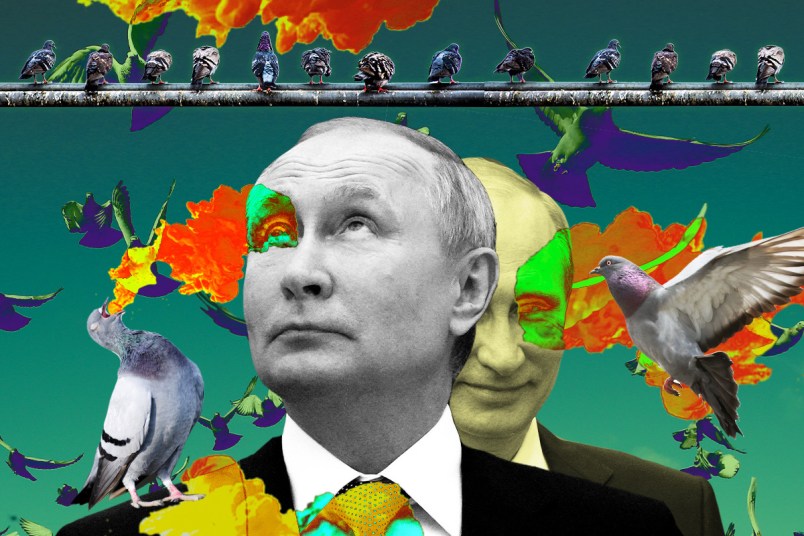Days before Russia invaded Ukraine, all the Kremlin and its proxies could talk about was potential aggression from Kyiv.
“The armed forces of the enemy are in combat formations and are ready for the forceful capture of Donbas,” Denis Pushilin, a Russian proxy leader operating in Ukraine, claimed on Feb. 16. “President of Ukraine Volodymyr Zelensky will soon issue a decree to the military to go on the offensive and implement a plan for the invasion of the territory.”
Ukraine, of course, never did invade.
But one week after Pushilin’s remarks, Russia launched its invasion of Ukraine’s territory, claiming to be on a peace-keeping mission.
That move — accusing an enemy of an act that you are about to or have committed — is a familiar tactic from Putin. In 2017, Putin himself remarked that the “U.S. has always interfered in Russia’s elections.”
And so Western policymakers have been alarmed in recent days to see the the Kremlin begin making insane noises about a potential chemical or biological attack in Ukraine, supposedly launched out of U.S.-sponsored biolabs.
“Now that Russia has made these false claims, and China has seemingly endorsed this propaganda, we should all be on the lookout for Russia to possibly use chemical or biological weapons in Ukraine, or to create a false-flag operation using them,” White House Press Secretary Jen Psaki said on Wednesday. “It’s a clear pattern.”
As if on cue, on Thursday, the Russian Ministry of Defense accused the U.S. of trying to manufacture birdborne viruses to attack Russia … in Ukraine.
Conveniently, in the Ministry’s telling, the newly discovered labs are in cities where Russia has focused much of its military attention: Kyiv, Kharkiv and Odessa.
It’s a trolling, bizarro-world, ex post facto echo of the U.S. claims about weapons of mass destruction that were never found in Iraq. But after weeks of war in Ukraine without a smidgen of a causus belli, the Kremlin appears to have seized on a fantasy that may appeal to germaphobes and American conservatives alike: birds, and the biolaboratories supposedly devoted to weaponizing them.
The Russian announcement is straight out of central casting, replete with a secret project code name and strategically located Ukrainian cities. The Kremlin calls it “Project UP-4,” allegedly involving labs in the three major Ukrainian cities in the crosshairs of the ongoing Russian offensive.
The core of the allegation is that the labs were to create a mutated bird flu virus with a 50 percent kill rate. The virus could, in the Kremlin’s telling, then spread via birds with migratory patterns across Russia.
“From all the U.S.-produced means of destabilizing the epidemiological situation, this is one of the most reckless and irresponsible, as it does not allow for the situation to be controlled further,” Russia’s Ministry of Defense said in the statement.
It’s a narrative that plays on Western conspiracy mongering around the origins of COVID-19, with some on the right still insisting that the virus was intentionally released by a U.S.-funded Chinese bioweapons lab.
In Russia’s iteration, it’s U.S.-funded research in Ukrainian biolabs that, two weeks after the war began, suddenly necessitates some form of Russian intervention.
Apart from the White House, other Western officials are raising the alarm about a potential biological or chemical weapons attack by Russia in Ukraine.
An unnamed NATO official told the Wall Street Journal that Russia seems to be creating a pretext for one, while British officials said at a briefing this week that “we’ve got good reason to be concerned about possible use of non-conventional weapons” in Ukraine.







The projection seems familiar.
It’s a trolling, bizarro-world, ex post facto echo of the U.S. claims about weapons of mass destruction that were never found in Iraq. But after weeks of war in Ukraine without a smidgen of a causus belli, the Kremlin appears to have seized on a fantasy that may appeal to germaphobes and American conservatives alike: birds, and the biolaboratories supposedly devoted to weaponizing them
… … … …
Birds aren’t real
Think I am joking?
Birds are really drones.
I believe that this is another dig at Hillary interfering in Russian elections in 2011, something along the lines of Hillary paid the Russian people to protest against Vlad.
Who do you think the Republicans stole it from?
It must be true. How else can you explain this?
Starting in Iowa to ruin thanksgiving. I bet @castor_troy is behind it.